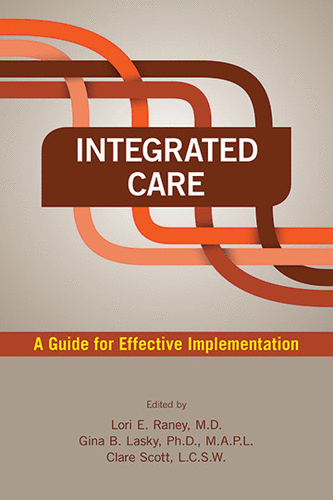Integrated Care: A Guide for Effective Implementation

Integrated Care: A Guide for Effective Implementation, by Lori E. Raney, M.D., Gina B. Lasky, Ph.D., M.A.P.L., and Clare Scott, L.C.S.W., addresses operational flaws that are inherent to the current health care system while providing effective resolution strategies that build a culture of collaboration between medical specialties. This book emphasizes the integration between behavioral health care and primary care but also paves way for policy development that can enhance collaboration between all specialties.
This book begins with a forward by Jürgen Unützer, M.D., M.P.H., who has long advocated for collaborative care teams within health care organizations and who continues to do so as chair of psychiatry at the University of Washington. He explains how sharing of information and resources between primary care and mental health providers is more effective than engaging in “parallel play” (p. ix).
This book is divided into three main parts: 1) A Design for Success; 2) The Provider Role: Changing Practice; and 3) Operational Considerations. Eight specific chapters are distributed within the three main parts, allowing readers to effortlessly reference specific topics of interest. This book notably emphasizes the importance of culture modification and leadership involvement. These factors need to be targeted to effectively incorporate integrated care. The cultures among behavioral health care and primary care systems continue to have significant differences, but the opportunity for common ground can be discovered with the proper guidance.
The barriers of integrated care are effectively tackled in this book by the in-depth discussions relating to team development, leadership strategies, financial funding models, and billing challenges. Case examples of actual clinical scenarios that incorporated a collaborative care model are provided throughout the text to help the reader envision such implementation.
By reading this book, the reader comes to further understand the significance of a team in the health care setting and how optimal patient care relies heavily on it. Interdisciplinary team development and communication are fundamental aspects of integrated care, which can make work more enjoyable and satisfying for health care providers. By focusing on policy design, the work environment can be structured in a way that nourishes vital components of an integrated health care system.
The barriers of integrated care within the United States health care system are a reality that is costly and detrimental to our patients. The United States spends more money on health care than any other country, and the strategies discussed in this book provide direction for leaders to improve diagnostic capability and eliminate wasteful spending. In summary, this resource is particularly vital for the sustainability of medical care.



